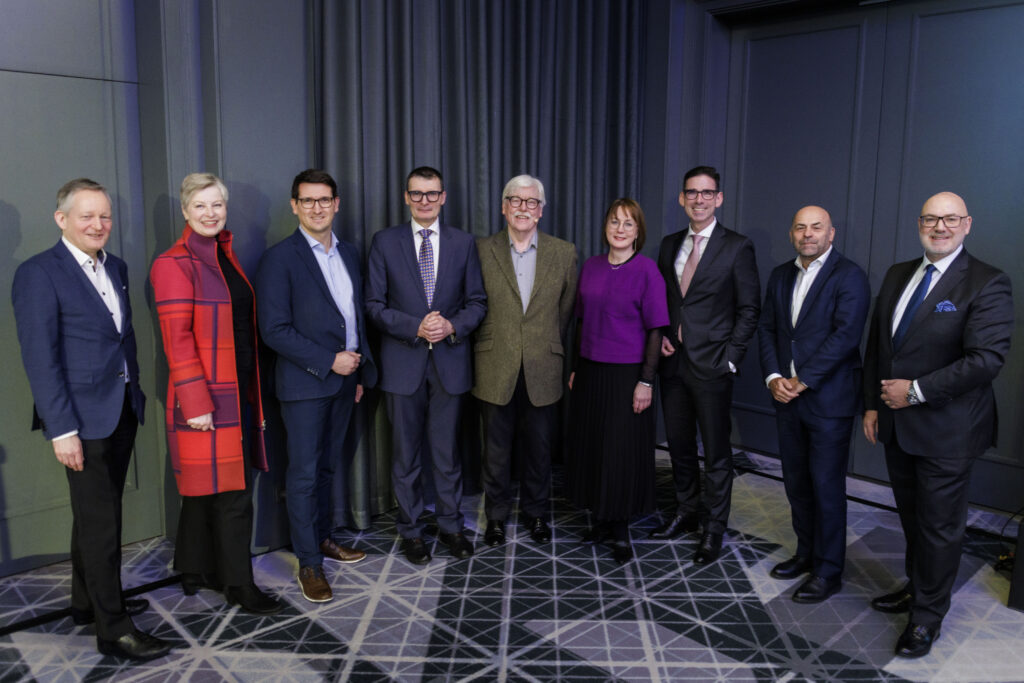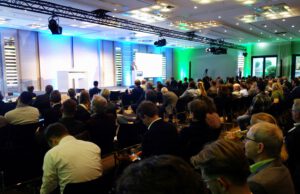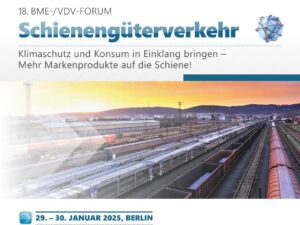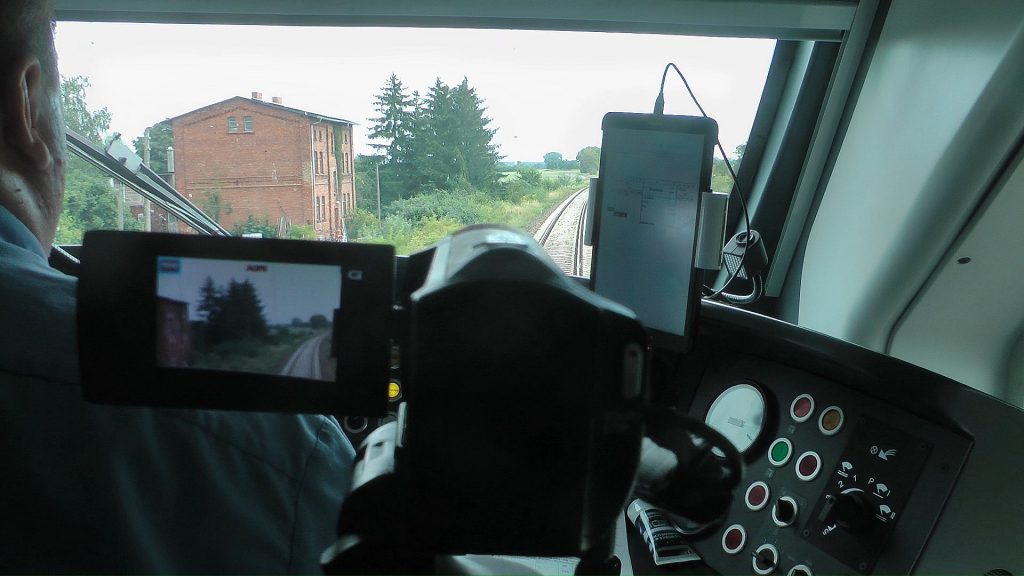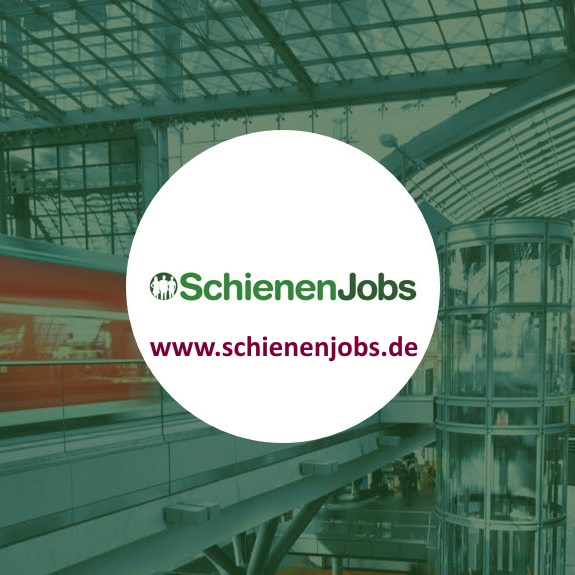DVF Presidium Chairman Prof. Dr.-Ing. Raimund Klinkner stated that both the competitiveness of companies and the acceptance of the transformation policy had suffered noticeably. The DVF is therefore advocating investments in the sector and a reduction in bureaucracy. “This requires a balance between regulation and upgrading of the infrastructure, unbureaucratic funding instruments, protection against competitive disadvantages compared to international providers with lower sustainability standards, innovation and investment,” said Klinkner. The completion of the trans-European transport networks, a harmonisation of standards and the uniform implementation of EU legislation in all EU member states are essential.
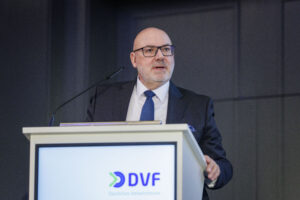
The drive change in all modes of transport must be driven forward, among other things, by supporting the ramp-up of alternative fuels. “The revenue from emissions trading in transport, CO2 components in taxes and other levies must flow back into the mobility sector and to consumers so that they can invest in the transformation.” Companies are willing and able to do this, as numerous examples show. “The focus of politics must therefore be on supporting the economy in achieving the agreed transformation goals. We must pull together,” warned Klinkner.
Hartmut Höppner, State Secretary in the Federal Ministry for Digital and Transport, saw the priorities of European transport policy in the coming years as a combination of climate protection, innovation-friendliness and competitiveness.
“With the Green Deal and the “Fit for 55″ package, a large regulatory package for more climate protection has been put together in recent years. Now the main focus must be on implementing the new regulations in practice.”

Jane Oispuu, representative of the European Commission in Germany, formulated the priorities in a similar way: “Strongly drive forward the transformation of the transport sector towards sustainability, better networking and digitisation – while at the same time strengthening its competitiveness.” The Commission’s new work program will be published on February 1st. The Green Deal will remain, but the EU will pay more attention to the issue of competitiveness, for example with the help of the Clean Industrial Deal.
Matthias Magnor, Chief Executive Officer (CEO), BLG Logistics Group AG & CO. KG, pointed out the high relevance of a European port strategy. This must strengthen ports as central hubs for global trade in goods, for defense capabilities and as economic actors. “Measures against climate change and to promote digitisation and automation play a significant role here.
Direct investments, free trade agreements and a long-term, reliable foreign trade integration are essential, as are investments in infrastructure and the energy transition. In addition, the EU must review the application of state aid law and effectively support the transformation of work.” Magnor stressed that climate protection and competitiveness must be brought into a reasonable balance, because there is no level playing field globally. If social acceptance of climate protection measures is lost, this will have a negative impact on the economy and could lead to political upheaval.
EU should promote harmonisation
Thomas Schöpf, Chief Sales Officer (CSO), Plasser & Theurer GmbH, emphasised the great importance of uniform European standards and approval criteria in order to complete the European transport market. “As long as national approval criteria supplement or replace the Europe-wide TSI (technical specifications for interoperability), a uniform market is not possible.
In addition, the introduction of new technologies such as ETCS cannot be commercially viable due to the small batch sizes due to national specifications. In addition, a general work permit for construction machines on closed tracks would facilitate construction work. This would be uniformly enforceable across Europe!” Schöpf sees the application of MEAT (Most Economical Advantageous Tender) as an opportunity to bring innovations into practice: “The MEAT principle enables costs to be considered over the entire life cycle and thus takes into account the higher investment costs and the efficiency improvements that arise from innovations in ongoing operations.” For companies in the automotive industry, the development of a refueling and charging infrastructure for alternative drives is important, also in order to be able to meet the goals of fleet renewal.

From the point of view of Christoph Schuler, Head of Public Affairs, MAN Truck & Bus SE, the so-called enabling conditions are crucial for the commercial vehicle industry. The Clean Industrial Deal should focus on the factors that are crucial for the success of the transformation: charging infrastructure and expansion of the power grids, lower electricity costs for production and at the charging station, debureaucratisation and faster approval procedures. “We see a need for improvement, especially in the development of the charging infrastructure for commercial vehicles. Although important projects are in the pipeline, implementation is significantly delayed by long approval procedures. We also see significant differences between the member states – but we need a charging infrastructure across Europe.”
High expectations of the Clean Industrial Deal
The representative of the European Commission in Germany, Jane Oispuu, emphasised the most important requirements of the Clean Industrial Deal: “Firstly, the Clean Industrial Deal should ensure that the public and private investments – which are so necessary for the transformation of our industries – are raised more quickly and decisively.
Secondly, to make a strong contribution to ensuring that Europe’s industry can take on a leading role internationally with its CO2-free and recyclable products, and thirdly, to provide instruments for reducing electricity prices, electrification, network expansion and, last but not least, simplifying approval procedures.” According to Oispuu, the Clean Industrial Deal could include initiatives and areas such as the Electrification Initiative, the Industrial Decarbonisation Accelerator Act, combating unfair trade practices, economic sovereignty, location policy, reducing bureaucracy, for example through the Omnibus Initiative, and creating green lead markets.”
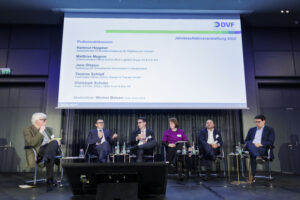
There were clear expectations from the business community: “The Clean Industrial Deal should include three key points: Firstly, investments in future-proof infrastructure for transport logistics and the energy transition in order to strengthen Germany as a location. Secondly, an internationally coordinated, business-friendly climate policy that avoids competitive disadvantages and inefficient special paths. Thirdly, a pragmatic approach: Ambitious goals are valuable, but must not be implemented at the expense of social stability or economic performance. The right balance must be found here,” demanded BLG boss Magnor.
MAN’s Schuler welcomed the fact that the new Commission was wasting no time and wanted to present the Clean Industrial Deal within the first 100 days: “We need a strong EU industrial policy to make the economy in Europe simpler and faster.
In our case, this means: There needs to be conditions and incentives so that the market itself regulates the transition to emission-free mobility. But this also includes sticking to the climate targets, because we need planning security.” State Secretary Höppner emphasized with regard to the Clean Industrial Deal: “In order to ensure Europe’s competitiveness, such a deal should address the following points in particular. Firstly: promoting research and innovation based on pioneering clean and digital technologies. Secondly: decarbonization should be pursued with an open technological approach. And thirdly: lean legislation, simple administrative procedures and efficient administration are necessary for the competitiveness of European companies.” dv


